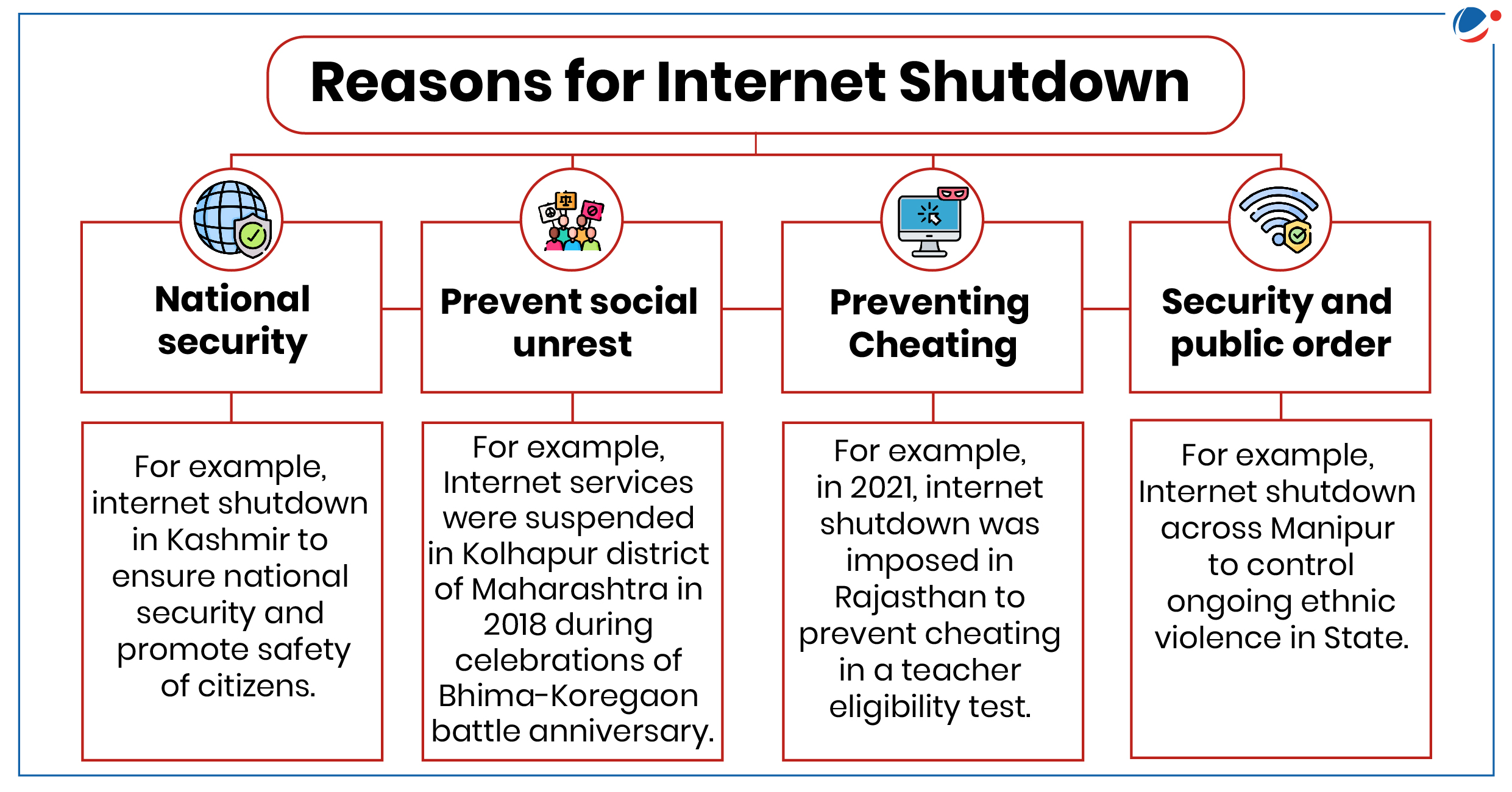Why in the news?
As per an 'Access Now' report, India witnessed 116 shutdowns in 2023, the highest number of shutdown in world for the sixth consecutive year.
Internet shutdown
- It is an intentional disruption of internet communications for specific population or within a location for any duration of time, often to exert control over the flow of information.
- In 2023, globally the number of internet shutdowns rose by 41% to 283 from 201 in 2022.

Provisions for Internet Shutdown
- Currently, suspension of telecom services (including internet shutdowns) is governed by Temporary Suspension of Telecom Services (Public Emergency or Public Safety) Rules, 2017, notified under Indian Telegraph Act, 1885.
- It provide for a temporary shutdown of telecom services in a region on grounds of public emergency (up to 15 days at once).
- The 1885 Act empowers the central government to regulate various types of telecom services including internet services and grant licenses for them.
- Orders of temporary suspension of telecom services are to be issued By Union/State home secretary Only.
- Under 2017 Rules, a three-member Review Committee headed by Cabinet Secretary at central level and Chief Secretary at state level, reviews telecom/internet shutdown orders by central government and state government, respectively.
Supreme Court Judgement in Anuradha Bhasin vs. Union of India and Ors. 2020
|
Impact of Internet Shutdown
- Economic loss: Shutdowns reportedly led to loss of $118 million in foreign investment from Jan- June 2023 alone in India.
- Also, a single-day shutdown can push up to 379 people into unemployment in the country.
- Fundamental rights: Internet shutdowns impacts access to information, curbing digital freedom and fundamental human rights such as freedom of speech and expression (Article-19), access to information etc.
- Inequality: Shutdowns disproportionately affect marginalized communities, hindering their access to newer revenue streams and opportunities. This exacerbates existing inequalities and undermines efforts towards equitable digitization.
- Disaster management: Loss of communication due to internet shutdown hinders information dissemination w.r.t. early warning, evacuation routes, further exacerbating the impact of disasters.
- The ongoing internet shutdown in Myanmar exacerbated the effects of Cyclone Mocha, which hit western Myanmar in May 2023
- Education and Healthcare: Shutdowns hinders access to online services such as education platforms, healthcare information etc.
- Protest and Violence: Internet shutdown disconnects people from the rest of the world, creating ambiguity and frustration. This can trigger strikes or protests that may become violent.
- Human rights abuse: Shutdowns impedes accountability where attackers utilise the disruption to cover up their offenses such as killing, arson, gender-based violence etc.
Way ahead
- Recommendations of Parliamentary Standing Committee on Communications and Information Technology
- Codifying defined parameters that constitute as public emergency and public safety.
- Public emergency and public safety have not been defined in the 1885 Act or the 2017 Rules.
- Putting in place a mechanism to decide the merit of an internet shutdown.
- Department in co-ordination with Ministry of Home Affairs (MHA) should lay down a clear principle of proportionality and procedure for lifting of shutdown so that these are not extended indefinitely.
- Department of Telecommunications (DoT) should formulate a policy to selectively restrict use of OTT services instead of banning the internet as a whole to ensure minimum inconvenience to public and curb misinformation.
- A study on the impacts of internet shutdowns and its effectiveness in dealing with public safety and public emergency should be conducted by DoT and MHA.
- Codifying defined parameters that constitute as public emergency and public safety.
- Government should clearly communicate to users any limitations, restrictions, or change to service they may experience and provide regular updates on status and duration of shutdown.








